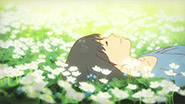 |
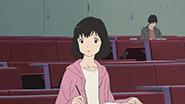 |
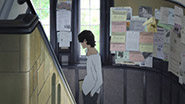 |
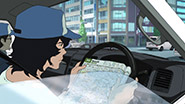 |
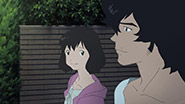 |
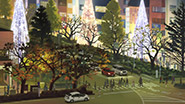 |
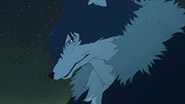 |
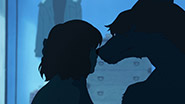 |
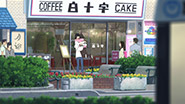 |
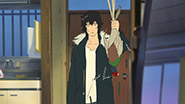 |
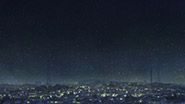 |
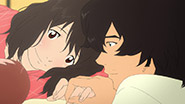 |
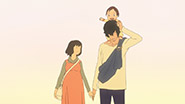 |
 |
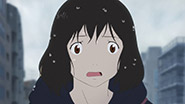 |
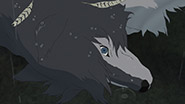 |
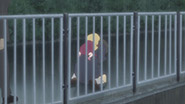 |
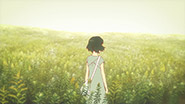 |
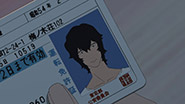 |
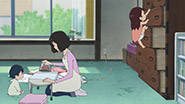 |
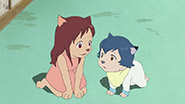 |
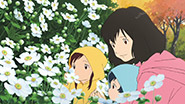 |
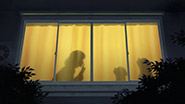 |
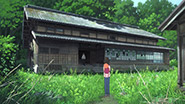 |
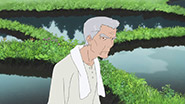 |
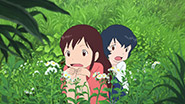 |
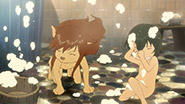 |
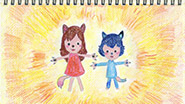 |
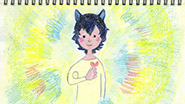 |
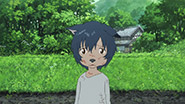 |
 |
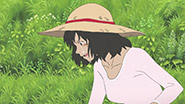 |
 |
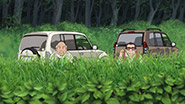 |
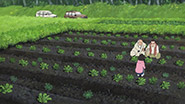 |
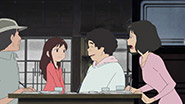 |
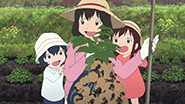 |
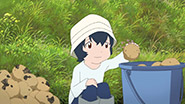 |
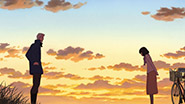 |
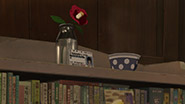 |
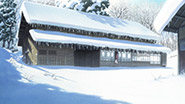 |
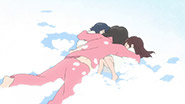 |
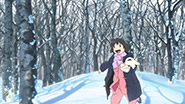 |
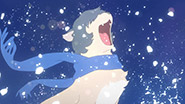 |
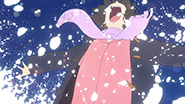 |
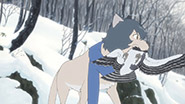 |
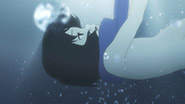 |
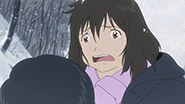 |
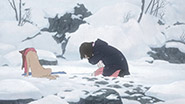 |
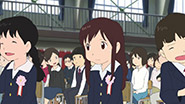 |
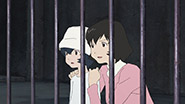 |
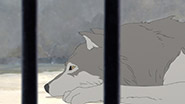 |
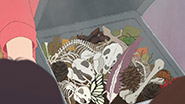 |
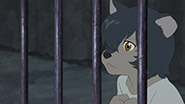 |
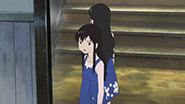 |
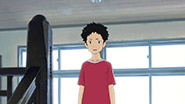 |
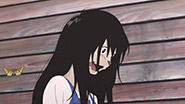 |
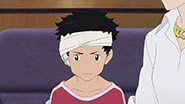 |
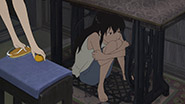 |
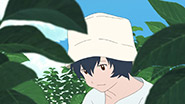 |
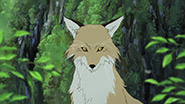 |
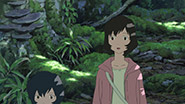 |
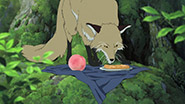 |
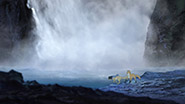 |
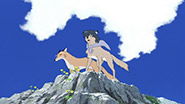 |
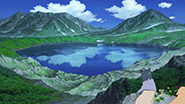 |
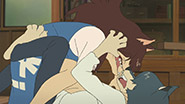 |
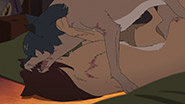 |
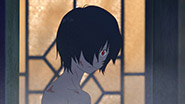 |
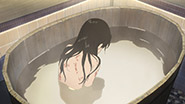 |
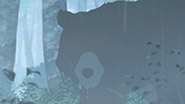 |
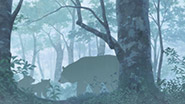 |
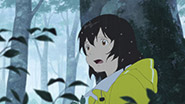 |
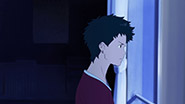 |
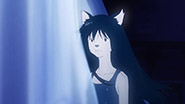 |
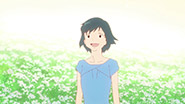 |
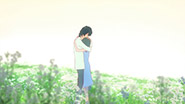 |
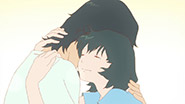 |
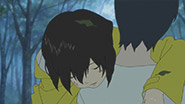 |
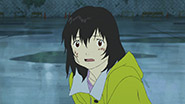 |
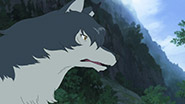 |
 |
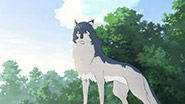 |
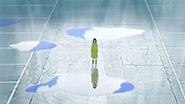 |
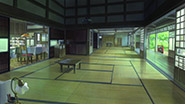 |
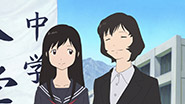 |
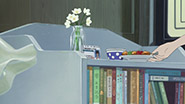 |
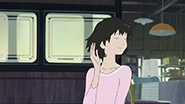 |
「おおかみこどもの雨と雪」 (Ōkami Kodomo no Ame to Yuki)
"The Wolf Children: Ame and Yuki"
Of all the directors who have been singled out as "The next Miyazaki" – including the one who calls the original "Otou-san" – Hosoda Mamoru the one who probably comes closest to being a candidate to fit the bill. I’ve written about this subject quite a bit – I expect it interests me rather more than than most people. But for all the improvement Goro Miyazaki displayed with Kokuriko-zaka Kara, he hasn’t shown the gifts of a true auteur yet (and seems to have limited interest in being a full-time writer/director). For all the unparalleled visual brilliance Shinkai Makoto has displayed, he’s much more of a poet than than a master of prose – an iconoclast whose work seems likely to thrill the serious anime community rather than become part of the public imagination. Only Hosoda, it seems to me, has both the gift of genius and the common touch – the potential to rival Miyazaki Hayao’s ability to create works of great art that also connect with viewers worldwide, even non-anime fans.
Of course that’s a blessing and a curse, because the last thing Hosoda-sensei needs or deserves is to be judged against the works of Miyazaki when he’s proven himself to be a singular talent at a relatively tender age. He’s directed extensively for television and several movies (mostly for Madhouse) but he’s effectively done three films that represent his own vision – The Girl Who Leapt Through Time, Summer Wars, and now Ookami Kodomo. All have been massive critical successes and all have been major commercial successes (especially Summer Wars). Rather than compare Wolf Children against anything any other director has done, then, it makes sense to judge it against those other two films if anything – and even more, on its own merits.
I saw this film in raw form in a Shinjuku Theater in October – in fact, it was the very first weekend after I arrived in Tokyo. I was very interested to see how my feelings about the movie would change after seeing it subtitled, and I’m surprised by how little they’ve done so. This might be because this was an especially good film to see raw – it’s far and away Hosoda’s most dialogue-free movie to date. He tells his story mostly through images here – in fact, I would go so far as to say Ame and Yuki is an astonishingly simple film. As such it seems a poor choice to burden it with a long and detailed analysis; rather, I think the best course is to speak in simple terms about the emotions the film elicits in me as a viewer.
As I said, this is really at heart an extremely straightforward and simple film. What could be more elemental as a basis around which to construct a story than a mother’s love for her children, to begin with? That spare sensibility extends to the visuals, too, which are beautiful in a faintly impressionistic way. This is not the hyper-realistic "God’s Eye" of Shinkai (who, in truth, I consider unrivalled in anime as a visual artist) nor is it the restless, spectacular creativity of Hosoda’s Summer Wars. This is if anything a series of interconnected still-lifes, depicting the odd little family at the heart of the movie as they progress in their journey through their life. Yet, for me it’s undeniable that the two most impressive scenes in the movie rely strictly on visuals, dialogue-free: a montage depicting the growing disassociation of brother Ame from sister Yuki as they spend their first years in school, and a wildly exuberant scene depicting the children and their mother as they rejoice in the wonders of their first snowy morning in the mountains. The ability to communicate so much through his eye alone is a talent that Hosoda has never shown to this degree before, and it implies great promise about his future as a director and the evolution of his vision.
Structurally, Ookami Kodomo is effectively a film in three acts. The first is a love story, depicting the warm and genuine but tragically short time together of young college student Hana (Miyazaki Aoi, truly superb) and a young man (Osawa Takao) whose name we never learn. The second is the chronicle of Hana’s years struggling to raise daughter Yuki (Ono Momoka) – born in the snow – and son Ame (Kabe Amon) born in the rain. And the third is the chronicle of those children beginning to find their own way in life, in unusual and challenging circumstances. All are charming in their way and each offer a unique pleasure to the viewer, but it’s in this middle section where Ame and Yuki really achieves transcendence – these scenes are beautiful both visually and emotionally, and the story they tell is the most approachable and involving.
The premise around which Ookami Kodomo is framed is that Hana’s lover is a wolf man – a descendent of the last wolves of Japan, capable of changing from human to wolf form virtually at will. The fact that this is never really explained might be an issue for some, but I’m comfortable with Hosoda’s choice here because it suits the story he’s trying to tell. This mixed heritage that Ame and Yuki share is the crux of the story – surely it’s metaphorical (and likely somewhat autobiographical) in the sense that Hosoda is trying to make a statement about the heartbreaking necessity that children choose a path that leads them away from their parents. But it also works as a conceit in and of itself because of the unique challenges it poses to Hana, and because of the places it takes the narrative and the opportunity it gives Hosoda to speak to the importance of acceptance, both of others and of our true selves.
The first major example of this is also perhaps the first time Ookami Kodomo reaches the level of greatness, and that’s with the integration of Hana and her family into the isolated mountain community where she’s chosen to raise her children free from prying eyes and child welfare bureaucrats. Hana rents a fabulously atmospheric but derelict old house and sets about trying to make a life for her family at the fringes of society. The locals are understandably skeptical, and have seen city folk pack it in and quit on numerous occasions, but there’s something in Hana’s determination that catches the eye of Nirasaki (Sugawara Bunta) the curmudgeon who acts as a sort of unofficial elder statesman for the locals. When he finally gives his grudging help to Hana, who’s failing miserably in trying to raise crops, it signals that she’s a part of the community – an irony as she fled the city to try and keep Ame and Yuki away from potential discovery by others. Surrounded by people Hana was alone, and in the wilderness she’s not – this is surely an intentional observation by Hosoda-sensei, who grew up in rural Japan before his career took him to Tokyo.
As Ame (now played by Nishii Yukito) and Yuki (Kuroki Haru, who also narrates) grow to school age, it appears that Yuki will be the one who embraces the lupine side of her heritage. She’s bold and fearless, forever restless and forever exploring. Ame, by contrast, is a shy and withdrawn boy who seems both afraid of his wolf lineage and of the way wolves are feared and vilified by humans, and mostly wants to stay close to his mother. But Yuki also desires to explore her human side by going to school, and resolves to blend in – which she does with mixed success until an encounter with transfer student Souhei (an excellent performance by 14 year-old Takuma Hiraoka) leaves him seriously injured and Yuki abashed and humiliated. Meanwhile Ame’s perspective clearly changes based on specific moments in his life. An impulsive attempt to hunt a kingfisher on that snowy morning. A lonely old timber wolf caged at the nature park where his mother takes a job for a pittance of a salary. And an encounter with a wild creature who, like Ame himself, is much more than it appears to the eye.
It becomes clear soon enough that Ame and Yuki’s hearts are pulling them in directions that are quite different than what we might have expected as the middle section of the film was unfolding. When I watched Ookami Kodomo raw, I felt that the lack of exposure to Ame’s perspective was a rare flaw in the film – the impact on me at the time was that his actions in the final act seemed to come on quite suddenly, and that the ending of the movie was rather jarring. I thought this might to some extent be a function of my limited Japanese comprehension, but in truth it’s clearly a conscious choice on Hosoda’s part. The movie is told in Yuki’s voice and mostly from Hana’s perspective, but in truth it winds up being a chronicle of Ame’s journey. I feel now that Hosoda kept us mostly in the dark about Ame’s inner conflicts quite intentionally. In part, I think this was to help us understand how distant he grew from his mother and sister. Whether it was a wise choice will be up to the individual viewer to decide – as to Ame’s decisions I do feel as though I understand them better upon a second viewing, though the subtitles have nothing to do with that – it’s strictly a matter of time and reflection on my part.
The ending has certainly proven the most controversial part of Wolf Children, and it’s easy to understand why. There are elements here that seem to me mysterious by design, because there are so many things Hosoda chooses not to share with us. Do Ame and Yuki age at a normal rate, or are they to some extent living the life of wolves? Yuki seems quite the normal tween, and an obviously deliberate contrast is painted between she and Souhei, desperate to be grown-up but feeling like children, and Ame. At age ten he’s still very much a child in his mother’s eyes, yet he seems remarkably mature for a boy of that age both mentally and physically (there’s a quite memorable scene where Yuki learns the terrifying reality of this). Perhaps the message here is that every child is unique, and so is the path they must walk.
That’s a hard lesson for a mother to learn, and make no mistake about it – the ending of the film is heartbreaking (in fact. as a whole, this is one of most heartbreaking anime I’ve seen in many years). Yet it might be seen to be a happy ending as well, depending on your perspective. I’ve seen quite vicious and vitriolic criticism leveled at Ame, but while my heart aches for Hana, I think his actions make perfect sense in the context of the story Hosoda is trying to tell. Ame has made his choice – he tried to tell his mother as a human, but her heart refused to let her see the truth. Ame finally trusts in his mother to understand him for what he is, and to accept him. As well, he trusts her to understand what he’s telling her about his feelings for her – and I think it’s very clear that she does. It’s an unconventional ending and a difficult one, bittersweet to be certain, but probably the only possible one Hosoda could have written.
While Ookami Kodomo doesn’t attempt to match the exuberant energy of Summer Wars or the youthful defiance of The Girl Who Leapt Through Time, I think it takes Hosoda-sensei to deeper emotional waters than any of his earlier work. It’s certainly his most subtle and reflective film – filled with moments of great joy but ultimately a more difficult work that explores the painful path that leads children away from their parents. Without question, Hana stands out as one of the most extraordinary characters of this or any anime year. She’s a hero in every sense of the word – both for what she does for her children and for what she doesn’t. Anime doesn’t celebrate motherhood all that often when you think about it, and Hosoda has righted that wrong in glorious fashion with Hana. Her labors are not tales of Herculean grandiosity, but no less heroic. She simply gives everything of herself for Ame and Yuki – she takes herself where she thinks she must for their sakes, and gives them everything that’s in her power to give, emotionally and otherwise. She smiles through her troubles and never allows her children to feel alone, right up until the moment where she realizes that for Ame’s sake, she has to act against every instinct and imperative in her being.
That Ookami Kodomo hasn’t proved to be quite as big a blockbuster as Summer Wars is hardly surprising – this is a film whose charms require a little more investment on our part to fully appreciate, and which asks more understanding of the audience in embracing its conclusion. The art of finding the profound in the simple is what separates great writers from good ones a lot of the time, I’ve always felt, and that’s what Hosoda has done here. It’s a different sort of brilliance than he’s shown us in the past, and perhaps surprising in that sense. Yet I think it’s a testament to his talent that his vision is continuing to evolve, and that he’s trying to find new ways of challenging both himself and his audience. He’s truly one of the giants of anime, and has already proved himself worthy to be one of its standard-bearers – if he should emerge as the next singular voice of the medium, films like Ookami Kodomo give substantial reason to believe he’ll be up to the challenge.

I watch this 2 times in cinema and I love it lol I cried
I cried as well! This is a great movie!
A giant poster ad for it in the underground walkway between Sapporo and Odori subway stations caught my attention during my summer exchange program. I decided to take a chance and forked out the 1800 yen to watch it. While not as exciting as Summer Wars in terms of the action, I really believe the storytelling got me invested in all the main characters.
It’s also good to know that Hosoda Mamoru is getting mainstream recognition as well, I actually chanced upon a TV special talking about the production of Wolf Children.
I am really looking forward to what he can come up next.
To me it started off really strong and had me interested in Ami and Yuki. Its just towards the end it fell kind of flat IMO. Its seems to me that maybe time was running out on the project and he just made the ending as best as he could.
I watched this in theater too last summer (in Taiwan). It was really good, I was totally moved by it. Unfortunately there weren’t many viewings and the movie only played in mornings because not enough people were watching it.
I teared up in the end – when Hana was desperately searching for Ame and then her subsequent reuniting with her husband. For a moment, I thought they killed Hana, which would have been very, very cruel.
If I had a ten year old who told me he wanted to live the forest i wouldn’t let him go either. At first, I was really mad at Ame, but I guess what he needed his mother to understand was that he was an adult at 10 years old, unlike any human child should be, and he just didn’t belong in the world of humans anymore.
I have to agree with you on the rushed ending, though more so on Ame’s part than Yuki’s. For us the viewer, we are guided by Yuki through the entire story including her own, yet receive nowhere close to as much attention to Ame. Perhaps what first triggered a flag was when Ame had his accident and narrator Yuki stated that he wasn’t to be the same again–for a good amount of time, it was really hard to see what HAD changed about Ame. It wasn’t until his encounter with “sensei” that came out of nowhere that we begun to realize that Ame and Yuki’s paths had gone their respective ways.
Beyond that though, Ame still suffered from a lack of development, a lack of foreshadowing clues that would lead us to his ultimate conclusion. Although it’s understandable that there were probably time constraints that limited Hosada’s ability to explore Ame as much due to his quiet and steady nature, it still remains a facet of the movie I’d wish they would expand on in say an extended cut.
Besides that, this was perhaps my favorite work yet coming from Hosada. While he still needs to work on his conclusions since Summer Wars, everything he paints before that is always effortlessly easy to get into and empathize with. Hana is the hardest working mother that I’ve ever seen, and it’s pleasant, VERY pleasant to see a mother under great stress that doesn’t crack as easily under pressure. Her dedication makes me cry and appreciate my own mother, since the sacrifices she makes resonates deeply with how I perceive my own mother.
tl;dr – they should’ve expanded on Ame, but other than that, amazingly emotional show. Love Hana to death.
I loved the movie as well. It was, imho, a time well spent to see the children grow up until the end of the movie. I, too, fell in love with Hana. What a wonderful woman she is.
Hmmm….I probably am one of the odd ones who doesn’t find the ending rushed and is happy with Ame’s story being told here. I mean, the story is told from Yuki’s perspective, and she didn’t get the first hand information either — she probably heard bits and pieces from Hana. The scenes with Ame parting ways with Hana at the parking lot and saying goodbye to his mother and telling her that he’d do fine (in his howls) were very touching. It’s also a turning moment that Hana learnt to accept and trust his son…and it’s the time to let go.
I do see the change in Ame — it’s just subtly told. From when Ame hated being a wolf to when he got interested in knowing more — he started to quit classes and go to the nature observatory — to when he put his interest in action by visiting his “sensei”, Ame had been growing gradually and subtly — he was no longer the timid little boy, and I was happy to see that he found his own identity. I like the howling at the end — it’s a very nice touch…it’s as if Ame was telling Hana — in his own way — that he’s doing fine.
Well, I don’t know — perhaps I kept re-watching this movie and started thinking everything myself and therefore not feel it rushed…lol. Although I would welcome a part 2 with open arms — I wish to find out how Hana, Yuki and Ame are doing and I want to see a reunion of them… Anyway, I guess I have become very interested in the characters.
I agree that Ame’s development should be sparse at best. I think the idea there should be convey the message of an image that Ame was too young and any parent would seriously think that he’s still too vulnerable to be let out on his own. He was clingy, withdrawn, hated his wolf heritage. Then in a blink of an eye, he wants to embrace something that you never knew he’d finally take. The struggle here was Hana’s inability to accept the idea that her son is now a grown man.
Having said, Ame was the proverbial mama’s boy. But because he suddenly grew up, the one who got hurt was Hana. Which pains them both. Hana in tears of having so little time left to enjoy his loving son’s company. And Ame conflicted as he ran back to the mountain and embrace his wolf-self.
Such impeccable story telling. I was a sobbing mess at so many points in the movie. Truly a bittersweet ending. It really shows a mother’s sacrifice. In some ways, after the movie, I felt guilt-ridden for how my mother, also a single parent, must feel now that my sister and I are grown and off in other cities.
Awesome movie and thanks for actually taking the time to blog it here, hopefully it will be incentive for others to try it out.
THANK YOU ! thank you! thank you! i was waitting fot this, I´m in love with Ame!
Wow I didn’t notice this was out! Can’t wait to watch it! Hosoda is a genius!
I think it’s no coincidence that this movie was released in the United States this week right when your review came out. I plan to see this very soon! Thanks!
Heh, I don’t know how it wouldn’t be a coincidence since I’m 6000 miles away from there, but you’re welcome.
Hana’s story was very inspirational. To have gone through so much and still continue to wear a smile. Both Yuki and Ame found their own paths to walk and I can only imagine what the rest of their lives would be like.
Yuki might go on to live a somewhat normal life at least she has that Souhei kid to share her secret with. As for Ame this might just be the romantic in me but I can see a pretty young girl getting lost in the wilderness and is saved by a handsome young man. Afterward start to get to know each other then and…well I think you all can see where this might be heading.
Moving story indeed despite not being flawless. I teared at the end of the show though not as bad as Summer Wars or The Girl Who Lept Through Time
Hana is depicted as a very inspirational mother. I’m so glad I watched it film to the very end.
When I first saw the movie poster, I mistakenly thought this was some Evangelion spin-off, turns out the reason for my misunderstanding was because character design was none other than Sadamoto Yoshiyuki.
Despite the title name, the real hero is Hana, who had to go through so much to raise her two kids after her husband’s passing away, away from the prying eyes of civilization and all on her own.
(Though the part about her pondering whether to take her sick kids to a pediatrician or a vet was kind of funny. )
The ending is bittersweet, with Ame seeking out his destiny as a wolf, while Yuki embraces her humanity (with the occasional showing of inu-mimi). And Hana reaping the fruits of her hard struggle as a content and proud mother.
Watched it on the plane. Loved the film.
I cried on the plane, lol, luckily I was on the last row and corner seat.
It’s very hard t knock something that’s 10,000 times better than anything Disney has put out in the last decade.
There was some cute moments in the film where Yuki was trolling her mom while entertaining neighbours.
I actually thought that Hana’s new community would catch on with several hints (her “garden” was untouched, etc.).
I wouldn’t say the end was rushed, but I felt a distance between the director and his audience begin in the storytelling.
IMHO, I think Mamoru Hosoda was able to execute ideas he had a solid understanding of quite well, but the story took
him to areas just a little outside of his experience, and while he didn’t lose the plot, he didn’t keep the same depth that
he started the story with. I kind of felt it begin when the sensei broke his leg, I though there would be more to it than
he broke his leg and won’t live much longer, so I’m (Ame) going to take his place.
Also, I would have like to know more about Souhei. We know he could smell Yuki, but beyond that, nothing. So one of
the most important attributes about Souhei and Yuki’s beginning relationship is never fully explained.
The saddest part of the movie for me (unless I misunderstood) was that Yuki, too left (home) at a relatively early age of 12,
but I didn’t get the feeling that she returned to visit her mother that often or at all? Also, we’re not told how old Yuki is
when she tells the story – 12? Still living at the school’s dormitory? Dating Souhei…?
Don’t get me wrong, I really enjoyed the movie and would love to see more of Mamoru Hosoda’s work.
The fact Yuki is narrating the story and is able to share her mom’s thoughts shows that she still keeps in touch or else she wouldn’t be able to know some of the things she knows.
Yea I can see her coming home for holidays and summer breaks not to mention the middle school is 5 hours away a daunting trip so naturally Yuki would decide to live in the dorms. Also how do we know Ame doesn’t come down from the mountains once in awhile is visit after all the ending shows him “calling” home.
You know maybe one of the reason Yuki has been taking an interest in how her mother raised the two them is because she probably wants to have kids of her own one day?
I hate chibis and grown-up ass adults in some cold, climate controlled recording studios voicing with their pseudo-little cutesy children voices! I’ve had just enough of that and I am not going take it anymore~~~!! ahaha!
…Other than that I don’t have much, positive or negative, to say on this since I didn’t see it.
Clearly you didn’t see it, as all of the children in the film are voiced by actual children.
oh okay then. That’s good.
Even though the children cutesy chibi designs still bothers me “only” visually (yeah, yeah, I get that they are small since they are pre-teen kids, but they still have eerie Japanese anime chibi features, face and all and I blame all other Japanese anime shows that does that for ruining it for me), but the whole kid voicing things certainly makes it better. I “always” appreciate children voicing children. Unlike say, recent Disney+pixar’s tendencies (i.e. Wreck it Ralph and Brave), the Japanese anime gets less break from me since it employs the Chibis way too much. That’s all~~!
This happens a lot, if not all U.S. produced cartoons and most animated movies.
Now it’s different if it’s a characterization (i.e. Bugs Bunny et. al.), but when portrayed
as children, it’s usually an adult voice “person”. Same for radio ads. A child can tell
that the voice is not that of another child, something Anime makers seem to understand.
But, art is subjective, and IMHO, it’s hard to be objective of an art you if haven’t witnessed
it for yourself. You should watch it.
Hosoda said he went out of his way to try and avoid the kids from looking too cute, notably by giving them a wide gab between their eyes (something Hana has as well), what makes them cute isn’t their design (in fact you can read some reviews that say they had to adjust to the art) but what they do.
Sorry to say this, but isn’t this somewhat have beastility element in it? I mean a wolf and a human female. Even wonder did he changed to his wolf-form in bed…
Does it inspired by some doujins? Or at least this anime *might* inspires some doujins…
Okay, I know the overall tone is really family-friendly, but still…
You don’t need to wonder: https://randomc.net/image/Ookami%20Kodomo%20no%20Ame%20to%20Yuki/Ookami%20Kodomo%20no%20Ame%20to%20Yuki%20-%20Movie%20-%20Large%2008.jpg
Have you seen the BD sales? Of course it has. Presumably you know where to find them if such things are of interest to you…
Err, I really not interested in *that* kind of doujin or similar things; I was just saying my two cents…
@totoum: then this might not be 100% family-friendly after all (I filter animes before showing them to my nephews/nieces).
P/S: Will smileys be made available in the future?
(Already finished watching the movie)
BTW, what’s the proper to describe the feeling to watch the father of your children being disposed by a garbage collection truck in front your own eyes? (;-;)
Argh, need edit button! Should be: “what’s the proper word to describe the feeling when the father of your children being disposed by a garbage collection truck in front your own eyes?”
heart-fucking-breaking
saw this at a festival a few months ago with a friend who’s not really into anime and we were both disappointed with it as a whole. the beginning with the “wolf dates human” story was a little weird even with the “accept who you are” thing going on. it was a showing for children mostly and there was a strange vibe to that. the first half was pretty nice and the children were cute but the mom’s character was too perfect and came off kinda one-dimensional at some point. my friend was thoroughly bored during the last half and i have to admit i didn’t like the melodramatic tone.
of course, being compared to miyazaki doesn’t really help his case because that’s a tremendous thing to say. hosoda clearly has talent (i loved the girl who leapt through time) and his own vibe but this movie really didn’t do it for me.
Thanks for the review. I can’t wait to watch this the 2nd time! It was a visual feast and a truly beautiful film. I preferred it to The Girl Who Leapt Through Time & Summer Wars and I hope more people would give this a chance. It’s absolutely appropriate for children and I’m recommending this to all my nieces/nephews.
I cry like a baby every time when Hana tells Ame to take care and live strong in the ending part of the movie.
This was probably the most beautiful film I’ve seen in years, anime or not. To me, it was everything it could have been an more. It hit every extreme from sadness to joy and everything in between; choosing your own life, finding independence, relying on others, being different and being accepted, changing your mind, and making it up. Brought me to tears in all the right ways. A masterpiece, in my opinion.
It’s curious that in the beginning Ame didn’t like the mountain but in the end he loved it so much that he ended up living there.I loved this movie,Hana’s a role model.
Thank for your wonderful review for this movie. It truly tells what this movie is trying to bring out to all of us. =)
It took me until the ending to realize that Ame ends up looking like his dad. I suppose then it’s also suitable that he becomes equally as mysterious, especially to my mind in the duty previously held by the fox mentor. The sequence of them running through nature was a definite highlight of the film.
Looking at it that way Ame may also server as a window into what his father was like when he was the same age, with a strong desire to live wild and be free. But, for whatever reason, he ended up with a deep longing for family and companionship.
When he met Hana he was a mellow, philosophical man with a keen interest in humanity. He likely chose to be a mover precisely because he wanted the chance to get a glimpse into different kinds of life and living, a chance he never had as a closely guarded orphan. It’s not as though he needed to work for a living he could have literally lived off the land after all.
So I think there’s reason to hope that Ame will likely follow in his father’s footsteps. He’ll live free, for now, but in time to come, his paternal instincts will kick in, and he’ll probably wander back home to roost.
The first impression about this movie is kind of ‘Tokiwo Kakeru Shoujo’
The atmosphere, and the pictures…
But it seems not entertaining…
the minute I saw your post, I “ran” to a website to watch the movie! I had been waiting for the subbed version for soooo long and, goodness, was it a good movie! Ame was in the background a lot, but I did like the unwavering determination he had to follow his path and the clear way he showed his mother his appreciation for how well she raised him (the howl). it made me a little sad that Yuki chose to be human all the way… or at least that’s the impression the story-telling gave…
I then came to this blog and read the review/comments and someone mentioned Summer Wars… so I “ran” and watched that too !! and it was a lot of fun as well ! I fell in love with that family and its quirks !
all in all: I had a wonderful evening after work last night with 2 really good OAV Movies !
i gotta be honest. Why can’t Ame just visit his mother from time to time? Oh well. Other than that it was a solid movie and that second half just flew by I couldn’t believe it.
We don’t know that he doesn’t visit her. It seems to me that at the moment he makes his decision, Ame is afraid to go back to human form in front of his mother for fear he won’t be able to go through with it. Once he’s lived free for a bit, I suspect he’d feel able return to her from time to time and acknowledge that the human part of him still exists.
Honestly, I don’t think he has to. Hana listening to Ame’s howl at the end of the movie is a testament to that. They may be separated by distance, but as mother and child, they’ve grown closer than ever. It’s as if we were seeing Ame calling out to Hana and say “Look at me! See how far I’ve gone! And see how much further I can go!”. We as viewers may feel the bitterness seeing them apart from each other, but I can’t help but believe that Hana was feeling truly blessed and happy. Nothing could have been sweeter than that.
You know I would have also liked to have seen Yuki grow up and get together with Souhei to maybe give his sidestory a little closure.
I regret not watching this on the big screen. Stunningly beautiful.
Finished watching this movie… Man, Ookami Kodomo has a Ghibli-quality to it!